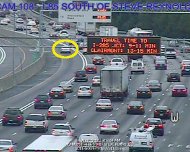12/29/2011
Georgia Backs Off on TollingUnpopular HOT lane project forces Georgia officials to pull the plug on efforts to impose tolls on existing freeway lanes.

Stung by the unprecedented unpopularity of the Interstate 85 high occupancy toll lanes (HOT lanes) in Gwinett County, Georgia officials announced earlier this month that they canceled a high-priority tolling project. The Georgia Department of Transportation (GDOT) had initially planned on replacing freeway lanes throughout the Atlanta metropolitan area with a $16 billion network of toll gates, but that plan came to a halt as the first phase of the overall strategy fizzled.
"The state of Georgia is canceling the Public Private Partnership (P3) procurement of the West by Northwest Corridor contract to add managed lanes to portions of Interstate Highways 75 and 575 in Cobb and Cherokee counties," Georgia Department of Transportation (GDOT) Transportation P3 Committee Chairman Brandon Beach said in a December 14 statement.
The Federal Highway Administration had already offered a loan of $275 million in federal dollars raised from the gas tax to underwrite the $1 billion cost of adding tolls. Though Governor Nathan Deal (R) backed the Northwest Corridor and I-85 tolling projects, they were developed by his predecessor. A survey conducted by pollsters at InsiderAdvantage last month found only 4 percent believed the new I-85 HOT lanes were effective (the margin of error for the poll was 5 percent). Many drivers were angered as they found themselves trapped in gridlock in the general purpose lanes on I-85 while the HOT lane, which was previously free to use for anyone driving with a passenger, remained comparatively unused.
Opponents of GDOT's tolling ambitions believe Deal is responsible for preventing the duplication of a project that has no statistically significant support among his constituents. Critics insist the same problems that plagued I-85 would carry over to the I-75 project.
"My take on this is that GDOT has acknowledged that the changes would make matters worse in the general purpose lanes, as well as the goal of the lane was not to ease traffic for all drivers but those willing to pay in times of need," Howard Rodgers wrote on the Stolen Lanes website.
The group's analysis of traffic data show that the HOT lanes made traffic significantly worse in the general purpose freeway lanes, forcing thousands of motorists to adjust their travel schedules to cope with the added congestion.


